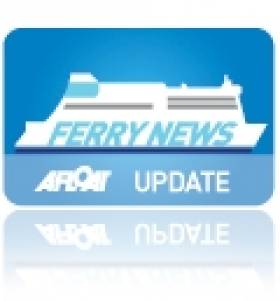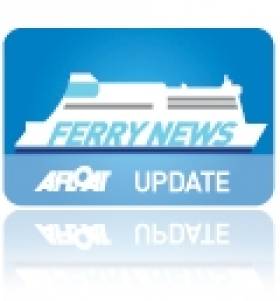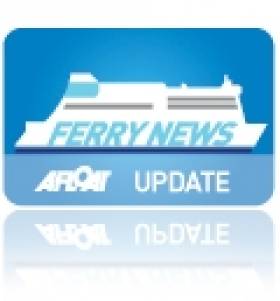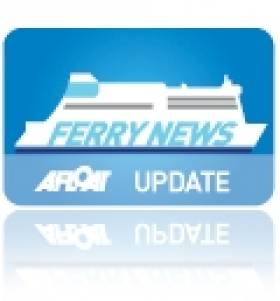Displaying items by tag: RosslareRoscoff
Seasonal French Route Service to Roscoff Reopens
#FerryRoscoff - Irish Ferries Rosslare-Roscoff route reopened last weekend, the seasonal-only operated service brings to three routes the operator has between Ireland and France, writes Jehan Ashmore.
In January, Irish Ferries launched the ro-pax Epsilon on the new direct Dublin-Cherbourg route as an 'economy' class service which is scheduled to operating a weekend-round trip and run all year-round.
The capital-continent link compliments Irish Ferries established Rosslare-Cherbourg served by the family friendly cruiseferry Oscar Wilde. The Wexford link to Normandy began in 1978, while the service to Roscoff in Brittany commenced in 1995.
# WINE FAIR MINI-CRUISE – Some passengers travelling on today's Irish Ferries inaugural sailing of the seasonal operated Rosslare-Roscoff route are taking a Wine Fair mini-cruise, writes Jehan Ashmore.
To celebrate the start of summer sailings to Roscoff, the special Wine Fair themed round-trip mini-cruise is been run in conjunction with a beverage supermarket located in the Breton port.
Before Oscar Wilde docks in France tomorrow morning those booked on the Wine-Fair sailing will hear lectures presented by wine-growers from leading wine regions. Among them are producers from Bordeaux, Loire Valley, Languedoc Roussillon, Loire Valley, South of France and the Rhône Valley.
Aside this weekend's Wine Fair mini-cruise, Irish Ferries have been running their regular mini-cruises which provide opportunities to purchase wine, beer on a DIY buying trip.
The first mini-cruise started this week on the Rosslare-Cherbourg and they are also available on sailings serving Roscoff. Mini-cruises are valid for travel from Ireland up to 19 June and from 27 August, subject to availability.
Overnight Sailing Marks End-of-Seasonal French Route
The former Scandinavian cruiserferry was built in 1987 to serve on Color Line's Oslo-Kiel route as their Kronprins Harald. In 2007 she was sold to start French sailings and at 31,914grt, she is the largest cruiseferry to operate under Irish Ferries continental routes. Passenger capacity is just shy of 1,500 and cars total 730 in addiition space for around 90 freight vehicles. For a virtual tour of the cruiseferry's on board facilities and exterior deck views click HERE.
Winter sailings will run to the end of the year with a final departure on 30th December outbound and returning from France on 2nd January 2012. Thereafter there will be a no sailings as the cruiseferry is to undergo annual dry-docking before resuming sailings. The first sailing from Ireland is 19th February and the corresponding return sailing from France is 21st February. To keep up-to-date with sailing schedules click HERE.
Seasonal Services Set Sail ‘Four’ France
Also operating on the same route to Normandy are Celtic Link Ferries which run the modern sleek Italian built 800 passenger /200 vehicle ro-pax ferry Norman Voyager. Short wine breaks are from €200 return for a car, driver and a two-berth outside cabin. Additional passengers can travel for €10 each way and subject to sailing schedules passengers can stay in Cherbourg for up to five hours.
A third operator to France is Brittany Ferries which sails on the Cork-Roscoff route and which is served by their 'flagship' Pont-Aven. The €100m ferry has a swimming pool and this is unique to any route operating out of Ireland. The company are offering one-way fares from €70 per person based on a car with four adults in an inside cabin.
Sailings depart Saturday's from Cork and arrive in the Breton port 14 hours later, making the route the shortest and fastest of the four continental services.
































































